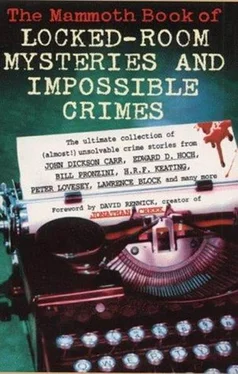Mike Ashley - The Mammoth Book of Locked-Room Mysteries And Impossible Crimes
Здесь есть возможность читать онлайн «Mike Ashley - The Mammoth Book of Locked-Room Mysteries And Impossible Crimes» весь текст электронной книги совершенно бесплатно (целиком полную версию без сокращений). В некоторых случаях можно слушать аудио, скачать через торрент в формате fb2 и присутствует краткое содержание. Жанр: Детектив, на английском языке. Описание произведения, (предисловие) а так же отзывы посетителей доступны на портале библиотеки ЛибКат.
- Название:The Mammoth Book of Locked-Room Mysteries And Impossible Crimes
- Автор:
- Жанр:
- Год:неизвестен
- ISBN:нет данных
- Рейтинг книги:3 / 5. Голосов: 1
-
Избранное:Добавить в избранное
- Отзывы:
-
Ваша оценка:
- 60
- 1
- 2
- 3
- 4
- 5
The Mammoth Book of Locked-Room Mysteries And Impossible Crimes: краткое содержание, описание и аннотация
Предлагаем к чтению аннотацию, описание, краткое содержание или предисловие (зависит от того, что написал сам автор книги «The Mammoth Book of Locked-Room Mysteries And Impossible Crimes»). Если вы не нашли необходимую информацию о книге — напишите в комментариях, мы постараемся отыскать её.
A new anthology of twenty-nine short stories features an array of baffling locked-room mysteries by Michael Collins, Bill Pronzini, Susanna Gregory, H. R. F. Keating, Peter Lovesey, Kate Ellis, and Lawrence Block, among others.
The Mammoth Book of Locked-Room Mysteries And Impossible Crimes — читать онлайн бесплатно полную книгу (весь текст) целиком
Ниже представлен текст книги, разбитый по страницам. Система сохранения места последней прочитанной страницы, позволяет с удобством читать онлайн бесплатно книгу «The Mammoth Book of Locked-Room Mysteries And Impossible Crimes», без необходимости каждый раз заново искать на чём Вы остановились. Поставьте закладку, и сможете в любой момент перейти на страницу, на которой закончили чтение.
Интервал:
Закладка:
Jerry nodded. The old boy at the table, he reflected, had certainly looked ill.
“I took my father back to our hotel, the Brittany, at half-past eleven,” the girl went on, speaking with great intensity. “I tried to communicate with Dr Hébert by telephone. I could not reach him. So I went to his house; it is only a short distance from the hotel. On the way I kept seeing that man – the man you call Davos. I thought he was following me. He seemed to be looking at me from behind every tree. That is why I said, ‘That’s the man,’ when I saw him lying on the pavement with his eyes open. His eyes did not even blink when the rain struck them. It was a horrible sight. I was upset. Do you blame me?”
M. Goron made a sympathetic noise.
“I reached Dr Hébert’s house at perhaps twenty minutes to twelve. Dr Hébert had retired, but he consented to go with me. I waited while he dressed. We went out, and on the doorstep we found – what you know. Please believe that is all I know about it.”
She had a singularly expressive voice and personality. She was either all anxiety or all persuasiveness, fashioning the clipped syllables. When she turned her wrist, you saw Davos lying in the rain and the searchlight wheeling overhead. Then she added abruptly in English, looking at Jerry:
“He was a nasty little beast; but I don’t for a moment believe you killed him.”
“Thanks. But why?”
“I don’t know,” said Eleanor simply. “You just couldn’t have.”
“Now there is logic!” cried M. Goron, giving his desk an admiring whack.
M. Goron’s swivel chair creaked with pleasure. There were many lights in his office, which smelt of creosote. On the desk in front of him lay Davos’s sodden wallet and (curiously) the tiny round box, wrapped in a spill of paper, which Eleanor Hood had been carrying. M. Goron never spoke to Jerry, never looked at him; ignored him as completely and blandly as though he were not there.
“But,” he continued, growing very sober again, “you will forgive me, mademoiselle, if I pursue this matter further. You say that Dr Hébert has been treating your father?”
“Yes.”
M. Goron pointed to the small box on the table.
“With pills, perhaps?”
“Ah, my God!” said Dr Hébert, and slapped his forehead tragically.
For several minutes Jerry had been afraid that the good doctor would have an apoplectic stroke. Dr Hébert had indicated his distinguished position in the community. He had pointed out that physicians do not go out in the middle of the night on errands of mercy, and then get dragged off to police stations; it is bad for business. His truculent eyeglasses and moustache bristling, he left off his stiff pacing of the room only to go and look the prefect in the eye.
“I will speak,” he said coldly, from deep in his throat.
“As monsieur pleases.”
“Well, it is as this lady says! Why are we here? Why? We are not witnesses.” He broke off, and slapped at the shoulders of his coat as though to rid himself of insects. “This young man here tells us a story which may or may not be true. If it is true, I do not see why the man Davos should have given him my address. I do not see why Davos should have been knifed on my doorstep. I did not know the man Davos, except as a patient of mine.”
“Ah!” said the prefect. “You gave him pills, perhaps?”
Dr Hébert sat down.
“Are you mad on the subject of pills?” he inquired, with restraint. “Because this young man” – again he looked with disfavour at Jerry – “tells you that Davos made some drunken mention of ‘pills’ at the Casino to-night, is that why you pursue the subject?”
“It is possible.”
“It is ridiculous,” said Dr Hébert. “Do you even question my pills on the desk there? They are for Miss Hood’s father. They are ordinary tablets, with digitalin for the heart. Do you think they contain poison? If so, why not test them?”
“It is an idea,” conceded M. Goron.
He picked up the box and removed the paper.
The box contained half a dozen sugar-coated pellets. With great seriousness M. Goron put one of the tablets into his mouth, tasted it, bit it, and finally appeared to swallow it.
“No poison?” asked the doctor.
“No poison,” agreed M. Goron. The telephone on his desk rang. He picked it up, listened for a moment with a dreamy smile, and replaced it. “Now this is really excellent!” he beamed, rubbing his hands. “My good friend Colonel March, of the English police, has been making investigations. He was sent here when a certain form of activity in La Bandelette became intolerable both to the French and English authorities. You perhaps noticed him at the Casino to-night, all of you?”
“I remember,” said Jerry suddenly. “Very large bloke, quiet as sin.”
“An apt description,” said the prefect.
“But -” began Dr Hébert.
“I said ‘all of you,’ Dr Hébert,” repeated the prefect. “One small question is permitted? I thank you. When mademoiselle telephoned to your house at eleven-thirty to-night, you were not there. You were at the Casino, perhaps?”
Dr Hébert stared at him.
“It is possible. But -”
“You saw M. Davos there, perhaps?”
“It is possible.” Still Dr Hébert stared at him with hideous perplexity. “But, M. Goron, will you have the goodness to explain this? You surely do not suspect either mademoiselle or myself of having any concern with this business? You do not think that either mademoiselle or I left the house at the time of the murder?”
“I am certain you did not.”
“You do not think either mademoiselle or myself went near a door or window to get at this accursed Davos?”
“I am certain you did not,” beamed the prefect.
“Well, then?”
“But there, you see,” argued M. Goron, lifting one finger for emphasis, “we encounter a difficulty. We are among thorns. For this would mean that M. Winton must have committed the murder. And that,” he added, looking at Jerry, “is absurd. We never for a moment believed that M. Winton had anything to do with this; and my friend Colonel March will tell you why.”
Jerry sat back and studied the face of the prefect, wondering if he had heard aright. He felt like an emotional punching-bag. But with great gravity he returned the prefect’s nod as a sergent de ville opened the door of the office.
“We will spik English,” announced M. Goron, bouncing up. “This is my friend Colonel March.”
“ ’Evening,” said the colonel. His large, speckled face was as bland as M. Goron’s; his fists were on his hips. He looked first at Eleanor, then at Jerry, then at Dr Hébert. “Sorry you were put to this inconvenience, Miss Hood. But I’ve seen your father, and it will be all right. As for you, Mr Winton, I hope they have put you out of your misery?”
“Misery?”
“Told you you’re not headed for Devil’s Island, or anything of the sort? We had three very good reasons for believing you had nothing to do with this. Here is the first reason.”
Reaching into the pocket of his dinner-jacket, he produced an article which he held out to them. It was a black leather note-case, exactly like the one already on M. Goron’s desk. But whereas the first was stuffed with mille notes, this one had only a few hundred francs in it.
“We found this second note-case in Davos’s pocket,” said Colonel March.
He seemed to wait for a comment, but none came.
“Well, what about it?” Jerry demanded, after a pause.
“Oh, come! Two note-cases! Why was Davos carrying two note-cases? Why should any man carry two note-cases? That is my first reason. Here is my second.”
From the inside pocket of his coat, with the air of a conjurer, he drew out the knife with which Davos had been stabbed.
Читать дальшеИнтервал:
Закладка:
Похожие книги на «The Mammoth Book of Locked-Room Mysteries And Impossible Crimes»
Представляем Вашему вниманию похожие книги на «The Mammoth Book of Locked-Room Mysteries And Impossible Crimes» списком для выбора. Мы отобрали схожую по названию и смыслу литературу в надежде предоставить читателям больше вариантов отыскать новые, интересные, ещё непрочитанные произведения.
Обсуждение, отзывы о книге «The Mammoth Book of Locked-Room Mysteries And Impossible Crimes» и просто собственные мнения читателей. Оставьте ваши комментарии, напишите, что Вы думаете о произведении, его смысле или главных героях. Укажите что конкретно понравилось, а что нет, и почему Вы так считаете.










